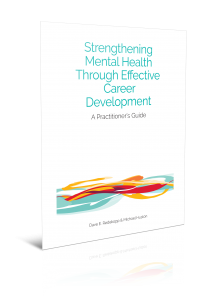Strengthening Mental Health Through Career Development is one of the most promising and encouraging works to come into the field of career development in a very long time. This work demystifies mental health, and shows how every practitioner can be a powerful change agent through career development practices.
Early in the book, co-authors Dave Redekopp and Michael Huston make the assertion that, “As a practitioner who does career development intervention – whether through counselling, teaching, advising, managing, or any other relevant function – you will influence mental health.” Given the rising tide of mental health concerns in all walks of life, this is a much-needed and most timely assertion. In a compelling and accessible writing style, the authors have created a resource that is a “must-have” for career practitioners.
Redekopp and Huston make the case for the role that career practitioners can play, do play and, most importantly, should play in supporting the mental health of clients. In doing so, they set out clear conceptual boundaries of what can and cannot be expected of career practitioners, situate practice within ethical and professional boundaries and provide practical strategies that make the career development/mental health links both intentional and powerful.

“Redekopp and Huston make the case for the role that career practitioners can play, do play and, most importantly, should play in supporting the mental health of clients.”
Early on, Redekopp and Huston suggest that Chapter 3 (Disentangling Terms) is one readers shouldn’t miss – and for good reason. The field of career development is awash with varying and often contradictory usages of terms such as “career,” and the authors take great pains to clarify how they use and distinguish between the terms career development and work, and between mental health and mental illness. It is here that they present the dual continua model of mental health and mental illness, which provides a novel perspective for understanding how career interventions can have a direct impact on mental health. This may be one of the most refreshing and liberating perspectives for career practitioners, especially when the authors introduce five dimensions of social well-being and the congruence of these dimensions with career development outcomes.
Another critical point the authors make is to challenge the assertion that career practitioners have “no business” in dealing with mental health issues. They provide a cogent argument that career interventions produce mental health outcomes, and so it becomes a professional obligation for practitioners to be aware of and intentional about those outcomes.
Although Redekopp and Huston have employed an accessible, user-friendly writing style, their work is anchored in both evidence and related scholarly literature. In the second chapter, they provide sobering statistics on mental illness prevalence rates, and the growing challenge of effectively addressing both mental illness and mental health. Too often, they argue, efforts that are expended address symptoms of mental illness at the expense of addressing the causes. Then, in Chapter 4, they provide a summary of what is currently known in the literature about the connections between and among their four core concepts: mental illness, mental health, work and career development. Given the paucity of direct research in the area, the authors also call on the field to engage in more robust explorations of these key connections.
Read more:
Career development and mental health: How can I practise ethically? (by Dave Redekopp and Michael Huston)
With these foundations, the authors present the cornerstone of their work in Chapter 5, where they articulate a framework for practitioners to begin to make sense of the connections between career development and mental health. They make a case for five categories of career development effects (life effects, ability effects, self-perception effects, opportunity perception effects and opportunity effects). For me, the framework for connecting one’s career practice with the career effects model and mental health/well-being is the essential read of the book.
Thankfully, Redekopp and Huston did not simply make the case for intentionally linking career development and mental health and then leave practitioners to their own devices to figure out how to do so. It was particularly encouraging to see how they demonstrated that competencies that practitioners already possess – such as fundamental interpersonal communication skills – are the bedrock for the inevitable positive influences on mental health that career interventions provide. In doing so, they also provide the technical language to help practitioners describe what they do. They devote an entire chapter to the unique challenges of stress and – borrowing heavily from Bryan Hiebert’s work – provide a practical guide for practitioners to better conceptualize client stress and help their clients with stress and/or stressor management. Chapter 10, “Tracking Mental Health Outcomes in Career Development Practice, provides a useful demonstration of how easy it is to track mental health outcomes, and the power of using evidence to support one’s practice.
Career practitioners may, quite reasonably, question their role and capability for improving the mental health of their clients. After reading this book, every practitioner will be able to say “I can do this”; because of this book, they will also be highly motivated to do so.






